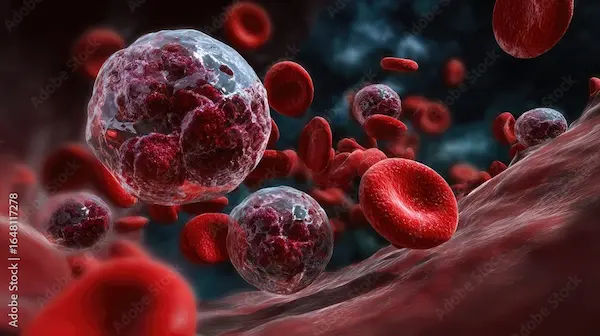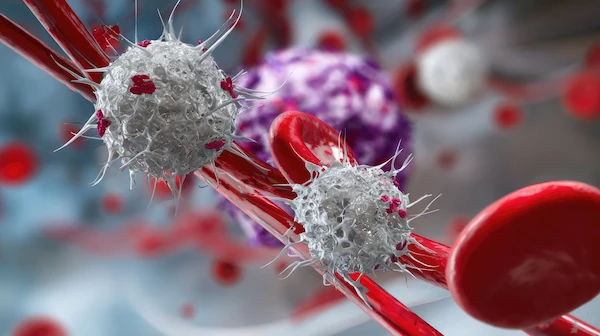Understanding Eosinophilia: Symptoms, Causes, and Treatment
Discover essential information about Eosinophilia, including its symptoms, common causes, and available treatment options. Learn how this condition is diagnosed and managed for better health.

Written by
Last updated on 13th Jan, 2026

Introduction
Eosinophilia is a condition where there is an unusually high number of eosinophils, a type of white blood cell, in your body. While eosinophils play an important role in fighting infections and allergies, too many of them can indicate an underlying health issue. If you or a loved one has been diagnosed with eosinophilia, it’s natural to have questions. This article will help you understand the condition, its symptoms, causes, and treatment options in simple terms.
What Is Eosinophilia?
Eosinophils are a type of white blood cell that help your immune system respond to infections, particularly parasitic infections, and allergic reactions. A normal eosinophil count in the blood is usually between 30 to 350 cells per microlitre. When this count rises above 500 cells per microlitre, it is called eosinophilia.
Eosinophilia can be:
- Mild (500–1,500 cells/μL) – Often caused by allergies or minor infections.
- Moderate (1,500–5,000 cells/μL) – May indicate chronic infections or autoimmune conditions.
- Severe (above 5,000 cells/μL) – Could signal serious conditions like blood disorders or cancers.
Consult a Haematologist for the best advice
Common Symptoms of Eosinophilia
Eosinophilia itself may not always cause noticeable symptoms, but the underlying condition leading to high eosinophil levels can. Some common symptoms include:
- Allergy-like reactions (rash, itching, sneezing, nasal congestion)
- Asthma or breathing difficulties
- Abdominal pain or diarrhea (if affecting the digestive tract)
- Fever, fatigue, or unexplained weight loss
- Swollen lymph nodes
- Muscle pain or weakness
If you experience any of these symptoms persistently, it’s best to consult a doctor for further evaluation.
What Causes Eosinophilia?
Several conditions can lead to an increase in eosinophils. Some common causes include:
1. Allergic Reactions
Asthma, hay fever, eczema, or drug allergies can trigger eosinophilia.
2. Parasitic Infections
Worm infections (like roundworms or tapeworms) often cause a rise in eosinophils.
3. Autoimmune Disorders
Conditions like eosinophilic esophagitis (EoE) or eosinophilic granulomatosis with polyangiitis (EGPA) can increase eosinophil levels.
4. Certain Medications
Some antibiotics, NSAIDs, or anti-seizure drugs may lead to eosinophilia as a side effect.
5. Blood Disorders & Cancers
Hypereosinophilic syndrome (HES) or leukemia can cause severe eosinophilia.
6. Other Infections & Diseases
Fungal infections, tuberculosis, or HIV may also contribute.
How Is Eosinophilia Diagnosed?
If your doctor suspects eosinophilia, they may recommend:
- Complete Blood Count (CBC): To measure eosinophil levels.
- Stool Test: To check for parasitic infections.
- Allergy Testing: If allergic reactions are suspected.
- Imaging Tests (X-ray, CT scan): To detect organ involvement.
- Bone Marrow Biopsy: In rare cases, to rule out blood cancers.
If you need to get tested, you can easily book a blood test or consultation through Apollo 24|7 for quick and accurate results.
Get Your Health Assessed
Treatment Options for Eosinophilia
Treatment depends on the underlying cause:
1. Allergy Management
Antihistamines, nasal sprays, or avoiding allergens can help.
2. Treating Infections
Parasitic infections are treated with antiparasitic medications.
3. Medication Adjustments
If a drug is causing eosinophilia, your doctor may switch medications.
4. Steroids & Immunosuppressants
For autoimmune conditions, corticosteroids (like prednisone) may be prescribed.
5. Targeted Therapy for Severe Cases
In rare cases, biologic drugs (like mepolizumab) are used for hypereosinophilic syndrome.
Lifestyle & Dietary Tips
While medical treatment is essential, some lifestyle changes can help manage eosinophilia:
- Avoid known allergens (dust, pollen, certain foods).
- Maintain good hygiene to prevent infections.
- Eat a balanced diet rich in antioxidants (fruits, vegetables, nuts).
- Stay hydrated to support immune function.
- Exercise regularly to boost overall health.
When to See a Doctor?
If you experience:
- Persistent fatigue, fever, or weight loss
- Severe allergic reactions or breathing difficulties
- Unexplained rashes or swelling
- Consult a doctor immediately. Early diagnosis can prevent complications.
Final Thoughts
Eosinophilia is often a sign of an underlying condition rather than a disease itself. While mild cases may resolve with simple treatments, severe eosinophilia requires medical attention. If you suspect you have symptoms, don’t hesitate to get tested.
Consult a Haematologist for the best advice
Consult a Haematologist for the best advice

Dr Abilash Jain
General Physician/ Internal Medicine Specialist
12 Years • MBBS,DNB(FM),MNAMS,FIAMS,CCGMG(GERIATRICS),DGM (GERIATRICS),PGCD(DIABETES,BOSTON UNIVERSITY),FID(DIABETICS UK)CCEPC(PALLIATIVE CARE),CCCC(CRITICAL CARE)
Visakhapatnam
Apollo Clinic Vizag, Visakhapatnam

Dr.sanchayan Mandal
Medical Oncologist
17 Years • MBBS, DrNB( MEDICAL ONCOLOGY), DNB (RADIOTHERAPY),ECMO. PDCR. ASCO
Kolkata
Dr. Sanchayan Mandal Oncology Clinic, Kolkata

Dr. E Prabhakar Sastry
General Physician/ Internal Medicine Specialist
40 Years • MD(Internal Medicine)
Manikonda Jagir
Apollo Clinic, Manikonda, Manikonda Jagir
(150+ Patients)

Dr. Ramalinga Reddy
General Physician
5 Years • MBBS MD General medicine
Bengaluru
PRESTIGE SHANTHINIKETAN - SOCIETY CLINIC, Bengaluru

Dr. Prabu P
Haematologist
29 Years • MBBS, MD(Gen.Med.)(JIPMER) , MRCP, Dip RCPath, FRCPath, CCT(U.K), Haemato - Oncology.
Chennai
Apollo Hospitals Greams Road, Chennai
(550+ Patients)
Consult a Haematologist for the best advice

Dr Abilash Jain
General Physician/ Internal Medicine Specialist
12 Years • MBBS,DNB(FM),MNAMS,FIAMS,CCGMG(GERIATRICS),DGM (GERIATRICS),PGCD(DIABETES,BOSTON UNIVERSITY),FID(DIABETICS UK)CCEPC(PALLIATIVE CARE),CCCC(CRITICAL CARE)
Visakhapatnam
Apollo Clinic Vizag, Visakhapatnam

Dr.sanchayan Mandal
Medical Oncologist
17 Years • MBBS, DrNB( MEDICAL ONCOLOGY), DNB (RADIOTHERAPY),ECMO. PDCR. ASCO
Kolkata
Dr. Sanchayan Mandal Oncology Clinic, Kolkata

Dr. E Prabhakar Sastry
General Physician/ Internal Medicine Specialist
40 Years • MD(Internal Medicine)
Manikonda Jagir
Apollo Clinic, Manikonda, Manikonda Jagir
(150+ Patients)

Dr. Ramalinga Reddy
General Physician
5 Years • MBBS MD General medicine
Bengaluru
PRESTIGE SHANTHINIKETAN - SOCIETY CLINIC, Bengaluru

Dr. Prabu P
Haematologist
29 Years • MBBS, MD(Gen.Med.)(JIPMER) , MRCP, Dip RCPath, FRCPath, CCT(U.K), Haemato - Oncology.
Chennai
Apollo Hospitals Greams Road, Chennai
(550+ Patients)



